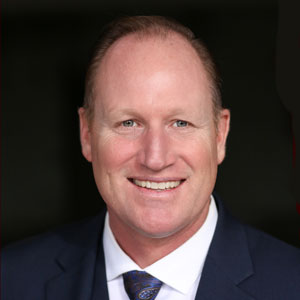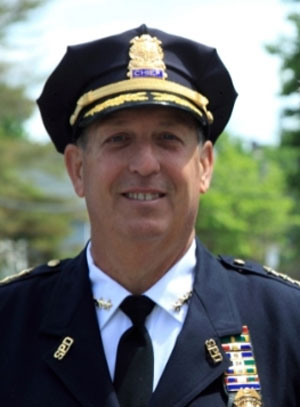 This article was written with the assistance of Dan Flippo who retired as a Deputy Chief of Operations after 29.5 years with the City of Santa Cruz Police Department. He now teaches for the Savage Training Group and for the National Tactical Officers Association.
This article was written with the assistance of Dan Flippo who retired as a Deputy Chief of Operations after 29.5 years with the City of Santa Cruz Police Department. He now teaches for the Savage Training Group and for the National Tactical Officers Association.
Good news, if you’ve made it to the chief’s interview, that means you’ve made it through some of the most significant challenges of the law enforcement hiring process. The chief’s interview is for that group of candidates that an agency is seriously looking at hiring. It’s not the end of the police hiring process. But once you’ve made it to your chief’s interview, there’s a good chance that you’re on par to get hired.
My knowledge is for California. However, across the country it is very similar. The chief’s interview is one of the last interviews that you will have other than possibly your medical or a psychological profile interview.
In a chief’s interview there’s more opportunity to discuss the candidate as an individual. While there are set questions, the chief or executive staff can stray from the questions a bit if there are possible issues about an applicants’ background or there’s something that the interviewers need to get to the bottom of. It’s a more of a personal interview, meaning that we’re really trying to answer those final questions that may have come up in the background. Or we’re looking at you as a good candidate, but we want to really know why you are choosing to work for our agency.
Most people are just trying to get into a law enforcement job, which can be challenging. But as chiefs, we also want to know that you’re going to be focused on the mission of that department, that you understand the working conditions of that department, the goals of that department, and that you’re going to be able to be in line with the overall theme of the community and the inner workings of that specific agency. Preparation is key for the Chief’s Interview and the Police Interview. Learn how to Pass the Interview.
The Purpose of the Chief’s Interview
The chief’s interview is a validation as far as whether or not we’re going to hire an individual. By the time they’ve made it to the chief’s interview, it means that they’ve gone through the intensive background process and we believe they are a hirable candidate who meets the police requirements. There may still be some concerns about something that came up in the background that’s not a disqualifier but could raise some questions. So, we’re going to take that chief’s interview to delve into those and make sure that when we make the final hiring decision and offer them a job, that all our concerns have been put to rest.

I understand that. However, because we’re going to invest a lot of resources into training you, we need to make sure there is a commitment level to our agency. When we received that response from this one individual, even though they were a shining candidate and we would love to have them with our agency, it disqualified them. We want to hire someone for the long run. So, if they are not sure we are the agency that they want to be a part of, we are hesitant about committing the time and resources to that person.
In that situation we said, “Thank you, and just let us know.” Pretty much at that point we determined that for longevity of a candidate, they probably weren’t the best candidate. Several weeks later they called back and said, “It hadn’t worked out for that other agency,” and they wanted to get hired by us, and unfortunately for that individual, we chose not to move them forward in the process just because of that lack of commitment.
Recognize that when you go to your chief’s interview, you must go in there expecting that they may give you a conditional job offer. It doesn’t always happen, but that’s pretty much the final process for us to make a hiring decision. Usually, we’re pretty good with the hiring decision before the chief’s interview even happens. If they do offer you a job and if you decline at that time, I don’t know how it’s going to work. I can’t speak for other agencies, but I know the agencies that I’ve been involved in the processes and it is similar. If you turn us down at that moment, then we’re probably not going to keep reaching out to you.
A Conditional Job Offer
A conditional offer of employment means that we want to hire you and we will hire you, but there are two medical processes that you have to go. One is the medical exam where you go to see a doctor, possibly run on a treadmill, do lab work. They want to make sure that you’re healthy enough for the rigors of the job.
The other medical process, and it varies from state to state and by agency, is the psychological profile test. Usually, it’s a written test, and then an interview with a psychologist. This is to make sure that you’re mentally stable enough for the job. (See: Police Psychological Test Questions) If you pass those two processes, then that conditional job offer is automatic. We must hire you at that point if you had a conditional job offer and you passed those two processes. The conditional job offer must be honored
Interview Details
How long a police oral interview lasts and who’s in it will vary. With some agencies it may just be the chief of police. Sometimes it will be with the sheriff or the under-sheriff. It depends on size of the agency. With larger agencies, you’re probably not going to speak to a chief or even an assistant chief. You may speak to a deputy chief or a captain.
The setting may vary from taking place in the chief’s office, to a small conference room. It may include up to three executive level officers. It can include a captain, deputy chiefs or assistant chiefs or under sheriffs, depending on the size of the agency.

Every interview process, every test, must be approved by the human resources department, just to make sure that it’s within law and that we’re not going rogue. We are not going to ask questions about marriage, race, religion or anything like that. There are set police interview questions that will be asked during the chief’s interview, but there is the ability to ask questions which delve deeper. If as a teenager you had a DUI arrest, driving under the influence arrest for say like alcohol, but it was a long time ago and you’ve had nothing else in your history, we just may ask you about that and just ask like, “Hey, this seems like it was a blip on the radar, but explain where you’re at with that, and what you learned. Did you learn anything from that?”
That’s a little bit more of in-depth questioning that we’ll ask. It usually has to do with if there was some low-level conviction or another example would be if in high school you were cited multiple times for speeding or excessive speed. We may ask because that’s a concern. Cops drive thousands of miles every year, and we want to make sure that you’re a good, safe driver. So, we may ask you some questions about that specifically like, “What did you learn? What’s changed?” to put ourselves at ease that you’ve got a level of maturity and that those mistakes from your youth aren’t carried forward as an adult.
Main Interview Questions
One of the main questions that is most likely going to be asked, and it’s similar for every interview, and I’ve seen this used at chief’s interviews. “Tell us a little bit about yourself.” We’ve got your whole police background packet, but we’re just seeing what you’re going to add. I would use that as an opportunity to very briefly discuss your resume because, in your background we’re going to probably have contacted every employer you’ve had so we have a rudimentary knowledge of your background and what you’re bringing to the table. It is, however, a good opportunity to quickly gloss over your resume and what you’ve done, but then really tell who you are. What are you bringing to the table? What are your strengths that you’re bringing, leadership qualities?
It can be anything. It could be you’re a bank manager somewhere, that shows you have leadership. You were a lead for your construction company or maybe you weren’t, but every employer said that you’ve got a great work ethic and they’d all hire you back. Those are all things that have a correlation in law enforcement, working in a team environment, but having the strength to do the job on your own. Those are all qualities that we want to know that individuals have.

So, that’s the first question. It may not come up, but you must be prepared because if you stumble over that one, that’s usually at the beginning of the interview. If they ask you what skills, strengths, and experience you have, whatever format the question is, you should be able to give a solid answer on that. That’s a question that you can really hit the ground running within the chief’s interview as far as coming out strong with a good introduction.
It can’t sound too rehearsed. Don’t come out and read it like it’s a poem or scripted because you want to come across as genuine. You’re going to be nervous; you’re going to be under pressure. Just relax. We recognize sitting on the other end of the table, we’ve all sat through multiple interviews. Just to have gotten to where we are in our positions, we’ve had to go through grilling processes and interviews. So, we know you’re nervous. Just let that go. It’s more about are you coming across as genuine and that will have a very powerful impact.
I have seen where that first question took somebody 25 minutes to talk themselves, which is great. It’s just too much. You totally lost your panel. So, one word of advice I’ll give you is if you’re in any interview and your interviewers put their pencils down or they lean back and they just look at you, you need to figure out how to come to conclusion on your statement. That means you’re starting to lose your panel, that you’ve gone too long on that point. So, clarity and conciseness are just the backbones of a good interview.
How Long should your Answers Be?
When talking about the jobs you’ve had, that should be under a minute. Your military experience, if you have any, should just be about what you did, and then maybe five minutes to seven minutes max talking about the your skill sets, your strengths. Five minutes seems like a long time, but if you’re truly talking about, “Hey, I’m a good communicator,” and you are giving some examples of how you use your communication skills, that five minutes will go by quick.
You may be asked about how you handle confrontation. We’re looking for an answer not as a police officer. We want to know that you can do the job, that you can handle the confrontations of the job.
Warning Flags
There are warning flags that come up. I remember one person said that they really want to be get the job to help child victims of crime, which is very honorable. Yes, we all want to help the innocents and the children, but the reality of actually dealing with child victims is very slender. Most of what you’ll be dealing with is mental health issues, addiction issues. Those are the calls that you’re getting.

As a chief of police, I need to know that you with your character are going to be able to start thinking about how you’re going to deal with this person in crisis. How do you take this volatile situation and have calm and courage and start putting some stabilization on that?
When somebody says, “I want to be a detective.” Well, that’s a great goal to have. You’ve got to do the job for three, five, 10 years before you’re even going to be considered for detective. Can you do that regular job? Do you have the fortitude to go to crisis situations and start putting some calm to situations?” because that’s basically what we do in law enforcement. We try to stabilize and take some action, but we want you to be smart and calm and make good decisions under stressful situations. (See: Find out if being a detective is right for you)
You’re going to be working with a team of men and women. You’re going to have peers. You’re going to have supervisors. How do you deal with personal conflicts within those groups? Because in any corporation, and in law enforcement, although it’s a paramilitary organization, it’s still a corporation, where you have people working together for the goal. What we sell is service, basically, to the community, and so how are you going to deal with conflicts?

There may be questions about how you handle stress. In law enforcement the trauma that law enforcement officer’s experience is real. So, we want to know, do you have healthy outlets to deal with that stress because when we hire somebody, we’re looking for the long-term, too. It takes about a year to get somebody up and running within my department. So, I don’t want to hire them for just a few years. I’m thinking long-term. But I also know that the job can be very demanding. So, what do they do to deal with that stress? What is their support network?
The final question that’s very important is, “What’s the mission of the department?” All departments have a mission statement, but, really, this is where you need to do your research as a candidate. What are the major initiatives that the chief has done in the last six months to a year? Community policing, community programs are something that every department is doing. You must understand of what the overall goal and mission of that department is and how are you going to fit in or how are you going to help carry that mission forward. So, if it’s community policing programs, if you’ve done any community service, that’s an outstanding thing, or you’ve been involved whether it was a high school level or college level or some community outreach, that’s a good experience that you can express. It shows that you’re willing to work outside of your shell and reach out to others.
Learn about the Chief

The city I worked in was very heavy tourism. Our population would double in the months with tourists. With that comes traffic and all those other related issues, but that’s not a problem for my department. We expect that there’s going to be more people in our city during those months.
If you interviewed with our department and talked about how one of the major issues to deal with was traffic problems, that will show you don’t really have a grasp of the enormity of the problems that we’re dealing with. We deal with addiction issues, violent crime issues, and people in mental health crisis or emotional crisis; those are problems that a lot of jurisdictions are dealing with. Google the problems that the department is facing, read some initiatives, but then also go on a ride along if you can and talk to people that work there in the department. What does the daily workload look like? Because that was always a big concern for my jurisdiction. We run a large city, and we are a very, very busy organization.
More so than some bigger agencies just in our surrounding area, just the call volume and the number of calls that we’re going to, that’s the one to have an understanding that that candidate can keep up with that workload. So, that means they must be able to articulate that they understand the workload. I understand they haven’t worked the job, but you can use Google or some other platform and find all this information out, what are the problems facing it? Most departments are going to post their call volume.
The Oral Board Interview
The oral board interview is a clean slate; maybe they’ve seen your application. They really don’t know anything about you. What the oral board panel wants to determine is if the person that they are interviewing seems like they have a grasp of the job and that they seem like they’re a viable candidate. Are they able to articulate themselves? Can they answer the questions? Preparing for the police oral board should include a thorough review of the job description.

It is fine to have career aspiration within an agency, but you must be able to explain that you can do the base level job because at a minimum, you’re doing that job. It depends on agency to agency, but a minimum three years before you even get any assignment, usually. It’s great that you have these future aspirations, but can you do the basic job and can you do it for a period of time without getting those aspirations because that’s another concern. I used that example of the person who was interested in helping children. That person we did in fact hire and that person quit through our training program. After we had already sent him to the 888-hour academy and they saw what the day-to-day job was and were like, “Yeah. No, not interested.”
I was a fairly young chief at that time and that experience changed my mind set for future candidates. Those things would ping as far as … It’s great that you have that aspiration for that future goal, but can you do the regular job and can you do regular job for a significant amount of time and not get dissuaded by it and then want to quit.
Your Strengths and Weaknesses
It is common to be asked the “what are your strengths” question and that’s an easy one. You should do some soul-searching and make sure that they’re just not words. So, if you say, “Hey, I’m a good leader,” well, what does that mean? Can you give us an example of what you’re saying by you’re a good leader or you foster a good team environment? You need to be able to explain, define what that means to you and give us some real-time examples of how those are present in your life.

The worst thing you can say about a weakness is “I’m a perfectionist.” People always turn that into a strength. “I’m a perfectionist,” that means it takes me a little bit longer to do the job, but what that really means is I turn out a great product. I take the extra time and really … and that’s great. Maybe that’s true, but it’s really you taking a weakness and try to sell it to us as a strength.
Talk about your weakness and how do you address that weakness? If you don’t like public speaking, well, as a police officer, you’re going to be out in public talking to people, so how would you work towards addressing that? We don’t expect you to be a rock star coming in there and just have everything nailed, but it really comes down to, “Do you have that own humility? Are you grounded enough to recognize things that you’re very strong at and recognize things that, ‘Hey, I still need to work at those’?”
Why our Department?
The question that comes up is, why our agency. Many agencies are hiring, so, what is significant about working for our organization? That’s, again, where you need to do your homework. You need to decide what is attractive about being a part of our agency. It can’t just be, “I want to be a cop and that’s it.” There are many types of law enforcement.

So, you must be able to answer the question, why are you testing with the agency that you’re testing with? Your response has to be, what is unique about that agency that attracts you? It could be that you went on ride along and the camaraderie here is exactly what you are looking for. We want people that are excited to come to work with us, that is the environment we want in our agency.
Applying with Multiple agencies
We will probably know if you are testing with other agencies. So, when you are asked about this, so must to be honest. Your job is to convince the chief that this is the agency you want to work for.
The Savage Training Group has a coaching program. If somebody’s interested in a coaching process, mostly for promotional positions, contact the Savage Training Group. Even for a new hire, if they just started a process, they could see how they do on their own. Then, if they are not doing well, the Savage Training Group can help them.
Learn more about Passing the Police Interview.

 Joseph Libowsky,
Joseph Libowsky,